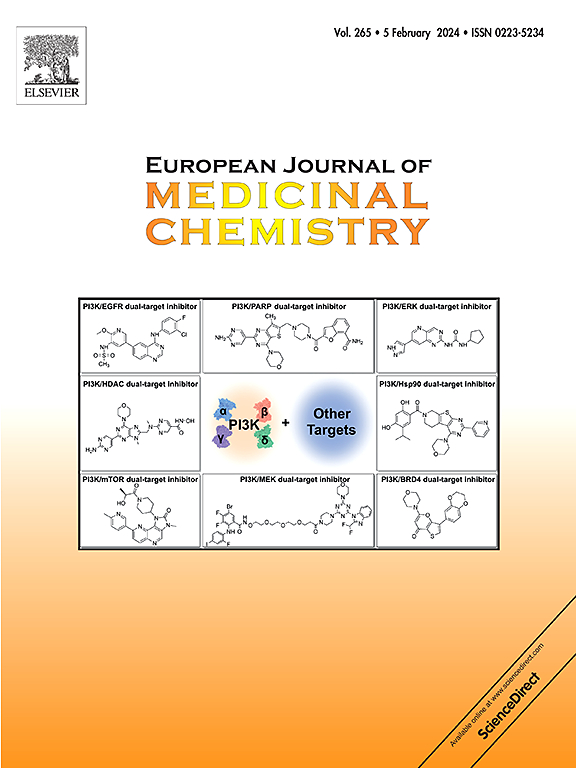Design, Synthesis, and Biological Evaluation of Chalcone Derivatives as Selective Monoamine Oxidase-B Inhibitors with Potential Neuroprotective Effects
IF 6
2区 医学
Q1 CHEMISTRY, MEDICINAL
引用次数: 0
Abstract
A series of chalcone derivatives was synthesized via Claisen–Schmidt condensation and further modified through selective reductions and amide couplings to explore their potential as monoamine oxidase B (MAO-B) inhibitors. Screening against recombinant human MAO-B identified compounds 4a, 4b, 4e, and 5a as potent inhibitors, showing submicromolar inhibition constants (Ki). Structure–activity relationship (SAR) analysis emphasized the relevance of a planar α,β-unsaturated carbonyl and specific aromatic substitutions for activity. Crystallographic studies showed conserved binding modes in the MAO-B active site, while computational analyses confirmed favorable interactions and conformational flexibility of compound 5a. Cytotoxicity assays in normal and cancer cell lines indicated minimal toxicity for 5a. Notably, 5a also exhibited neuroprotective effects in SH-SY5Y cells exposed to 6-hydroxydopamine (6-OHDA), a model of Parkinson’s disease. These findings demonstrated the importance of structural fine-tuning within the chalcone scaffold to achieve MAO-B selectivity and identify compound 5a as a promising, non-toxic candidate for neurodegenerative disease treatment.

具有潜在神经保护作用的选择性单胺氧化酶- b抑制剂查尔酮衍生物的设计、合成和生物学评价
通过Claisen-Schmidt缩合合成了一系列查尔酮衍生物,并通过选择性还原和酰胺偶联进一步修饰,以探索其作为单胺氧化酶B (MAO-B)抑制剂的潜力。对重组人MAO-B进行筛选,发现化合物4a、4b、4e和5a为有效抑制剂,具有亚微摩尔抑制常数(Ki)。构效关系(SAR)分析强调了平面α、β-不饱和羰基和特定芳香取代与活性的相关性。晶体学研究显示MAO-B活性位点的结合模式保守,而计算分析证实化合物5a具有良好的相互作用和构象柔韧性。正常和癌细胞系的细胞毒性试验表明,5a的毒性很小。值得注意的是,5a在暴露于6-羟基多巴胺(6-OHDA)(帕金森病模型)的SH-SY5Y细胞中也表现出神经保护作用。这些发现证明了查尔酮支架结构微调对于实现MAO-B选择性的重要性,并确定了化合物5a作为一种有前途的、无毒的神经退行性疾病治疗候选者。
本文章由计算机程序翻译,如有差异,请以英文原文为准。
求助全文
约1分钟内获得全文
求助全文
来源期刊
CiteScore
11.70
自引率
9.00%
发文量
863
审稿时长
29 days
期刊介绍:
The European Journal of Medicinal Chemistry is a global journal that publishes studies on all aspects of medicinal chemistry. It provides a medium for publication of original papers and also welcomes critical review papers.
A typical paper would report on the organic synthesis, characterization and pharmacological evaluation of compounds. Other topics of interest are drug design, QSAR, molecular modeling, drug-receptor interactions, molecular aspects of drug metabolism, prodrug synthesis and drug targeting. The journal expects manuscripts to present the rational for a study, provide insight into the design of compounds or understanding of mechanism, or clarify the targets.

 求助内容:
求助内容: 应助结果提醒方式:
应助结果提醒方式:


